Deck 5: Quadratic Functions and Models
Question
Question
Question
Question
Question
Question
Question
Question
Question
Question
Question
Question
Question
Question
Question
Question
Question
Question
Question
Question
Question
Question
Question
Question
Question
Question
Question
Question
Question
Question
Question
Question
Question
Question
Question
Question
Question
Question
Question
Question
Question
Question
Question
Question
Question
Question
Question
Question
Question
Question
Question
Question
Question
Question
Question
Question
Question
Question
Question
Question
Question
Question
Question
Question
Question
Question
Question
Question
Question
Question
Question
Question
Question

Unlock Deck
Sign up to unlock the cards in this deck!
Unlock Deck
Unlock Deck
1/73
Play
Full screen (f)
Deck 5: Quadratic Functions and Models
1
The quadratic function  has a vertex at
has a vertex at  .
.
 has a vertex at
has a vertex at  .
.True
2
The vertex of  is
is  .
.
 is
is  .
.True
3
The equation  has 2 real solutions.
has 2 real solutions.
 has 2 real solutions.
has 2 real solutions.False
4
 is a factor of the perfect square
is a factor of the perfect square  .
.
Unlock Deck
Unlock for access to all 73 flashcards in this deck.
Unlock Deck
k this deck
5
Which one of the following graphs illustrate the function  ?
?
A)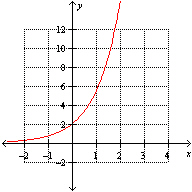
B)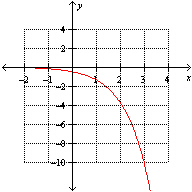
C) None of these options
D)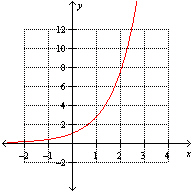
E)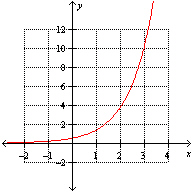
 ?
?A)

B)

C) None of these options
D)

E)


Unlock Deck
Unlock for access to all 73 flashcards in this deck.
Unlock Deck
k this deck
6
The graph of  is obtained from the graph of
is obtained from the graph of  by shifting the graph left 5 units.
by shifting the graph left 5 units.
 is obtained from the graph of
is obtained from the graph of  by shifting the graph left 5 units.
by shifting the graph left 5 units.
Unlock Deck
Unlock for access to all 73 flashcards in this deck.
Unlock Deck
k this deck
7
The graph of  opens upward.
opens upward.
 opens upward.
opens upward.
Unlock Deck
Unlock for access to all 73 flashcards in this deck.
Unlock Deck
k this deck
8
Which one of the following graphs illustrate the function  ?
?
A)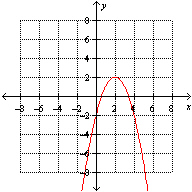
B)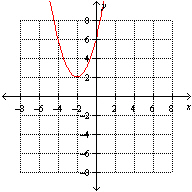
C) None of these options
D)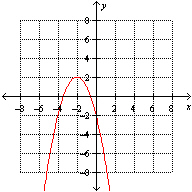
E)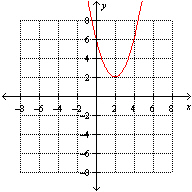
 ?
?A)

B)

C) None of these options
D)

E)


Unlock Deck
Unlock for access to all 73 flashcards in this deck.
Unlock Deck
k this deck
9
The quadratic function  has a maximum value at
has a maximum value at  when
when  .
.
 has a maximum value at
has a maximum value at  when
when  .
.
Unlock Deck
Unlock for access to all 73 flashcards in this deck.
Unlock Deck
k this deck
10
Which one of the following functions translates the graph of  to a new graph g with a vertical shift down 3 units and a horizontal shift left 8 units.
to a new graph g with a vertical shift down 3 units and a horizontal shift left 8 units.
A)
B)
C)
D)
E)
 to a new graph g with a vertical shift down 3 units and a horizontal shift left 8 units.
to a new graph g with a vertical shift down 3 units and a horizontal shift left 8 units.A)

B)

C)

D)

E)


Unlock Deck
Unlock for access to all 73 flashcards in this deck.
Unlock Deck
k this deck
11
A function f is given by the table. Find . 
A) 3
B) -1
C) 4
D) -4
E) 0

A) 3
B) -1
C) 4
D) -4
E) 0

Unlock Deck
Unlock for access to all 73 flashcards in this deck.
Unlock Deck
k this deck
12
Which one of the following graphs illustrate the function  ?
?
A)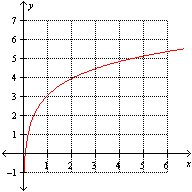
B)
C) None of these options
D)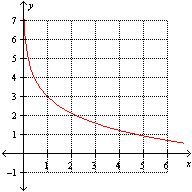
E)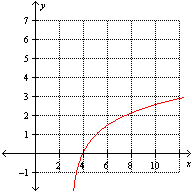
 ?
?A)

B)

C) None of these options
D)

E)


Unlock Deck
Unlock for access to all 73 flashcards in this deck.
Unlock Deck
k this deck
13
The minimum value of the quadratic function  occurs when
occurs when  .
.
 occurs when
occurs when  .
.
Unlock Deck
Unlock for access to all 73 flashcards in this deck.
Unlock Deck
k this deck
14
The quadratic function  has a maximum value at
has a maximum value at  .
.
 has a maximum value at
has a maximum value at  .
.
Unlock Deck
Unlock for access to all 73 flashcards in this deck.
Unlock Deck
k this deck
15
Which one of the following functions translates the graph of  to a new graph g with a reflection about the x -axis, a vertical stretch by a factor of 6, and a horizontal shift left 5 units.
to a new graph g with a reflection about the x -axis, a vertical stretch by a factor of 6, and a horizontal shift left 5 units.
A)
B)
C)
D)
E)
 to a new graph g with a reflection about the x -axis, a vertical stretch by a factor of 6, and a horizontal shift left 5 units.
to a new graph g with a reflection about the x -axis, a vertical stretch by a factor of 6, and a horizontal shift left 5 units.A)

B)

C)

D)

E)


Unlock Deck
Unlock for access to all 73 flashcards in this deck.
Unlock Deck
k this deck
16
If the y -values of a set of data decrease by 7 for each increase of 1 in the x -values, a quadratic function may be appropriate to model the data.

Unlock Deck
Unlock for access to all 73 flashcards in this deck.
Unlock Deck
k this deck
17
In the equation  , the value of a is
, the value of a is  , the value of b is 7 and the value of c is 4.
, the value of b is 7 and the value of c is 4.
 , the value of a is
, the value of a is  , the value of b is 7 and the value of c is 4.
, the value of b is 7 and the value of c is 4.
Unlock Deck
Unlock for access to all 73 flashcards in this deck.
Unlock Deck
k this deck
18
If the y -values of a set of data increase by different amounts when the x -values increase by the value of 6, then a linear function will best model the data.

Unlock Deck
Unlock for access to all 73 flashcards in this deck.
Unlock Deck
k this deck
19
Which one of the following graphs illustrate the function  ?
?
A)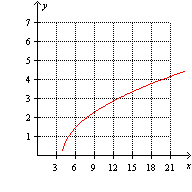
B)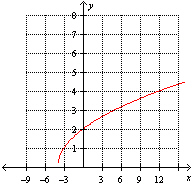
C)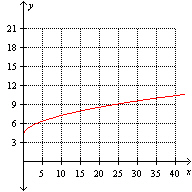
D)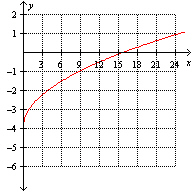
E)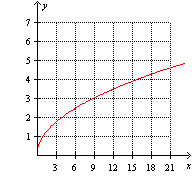
 ?
?A)

B)

C)

D)

E)


Unlock Deck
Unlock for access to all 73 flashcards in this deck.
Unlock Deck
k this deck
20
Let  and let
and let  . If
. If  , then the number of x -intercepts for the graph of f is 0.
, then the number of x -intercepts for the graph of f is 0.
 and let
and let  . If
. If  , then the number of x -intercepts for the graph of f is 0.
, then the number of x -intercepts for the graph of f is 0.
Unlock Deck
Unlock for access to all 73 flashcards in this deck.
Unlock Deck
k this deck
21
Given the function  , find the average rate of change between
, find the average rate of change between  and
and  .
.
A) 0.05
B) 21
C) 7
D) 147
E) -3
 , find the average rate of change between
, find the average rate of change between  and
and  .
.A) 0.05
B) 21
C) 7
D) 147
E) -3

Unlock Deck
Unlock for access to all 73 flashcards in this deck.
Unlock Deck
k this deck
22
Using the graph below, find the y -value at which the minimum value of the function occurs. 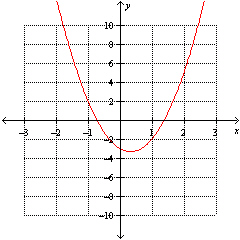
A)

B)

C)
D) 2
2
E)

A)


B)


C)

D)
 2
2E)


Unlock Deck
Unlock for access to all 73 flashcards in this deck.
Unlock Deck
k this deck
23
Using the graph below, find the x -value at which the minimum value of the function occurs. 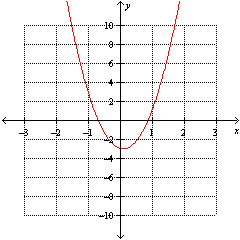
A)
B)

C)

D)
E)

A)

B)


C)


D)

E)


Unlock Deck
Unlock for access to all 73 flashcards in this deck.
Unlock Deck
k this deck
24
In a suspension bridge, the shape of the suspension cables is parabolic. The bridge shown in the figure has towers that are 500 m apart, and the lowest point of the suspension cables is 120 m below the top of the towers, as shown below. Find a quadratic function that models the parabolic part of the cables, placing the origin of the coordinate axes at the vertex. 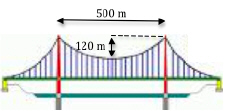
A)
B)
C)
D)
E)

A)

B)

C)

D)

E)


Unlock Deck
Unlock for access to all 73 flashcards in this deck.
Unlock Deck
k this deck
25
If  represents Mark s driving distance (in miles) after t minutes on the road, which one of the following would describe the meaning of
represents Mark s driving distance (in miles) after t minutes on the road, which one of the following would describe the meaning of  ?
?
A) Not enough information.
B) Mark's driving distance plus an additional 5 miles.
C) Mark's driving distance after traveling for 5 minutes.
D) Mark s driving distance while traveling miles per minute.
miles per minute.
E) Mark s time driving on the road is minutes.
minutes.
 represents Mark s driving distance (in miles) after t minutes on the road, which one of the following would describe the meaning of
represents Mark s driving distance (in miles) after t minutes on the road, which one of the following would describe the meaning of  ?
?A) Not enough information.
B) Mark's driving distance plus an additional 5 miles.
C) Mark's driving distance after traveling for 5 minutes.
D) Mark s driving distance while traveling
 miles per minute.
miles per minute.E) Mark s time driving on the road is
 minutes.
minutes.
Unlock Deck
Unlock for access to all 73 flashcards in this deck.
Unlock Deck
k this deck
26
Using the graph below, find the x -value at which the maximum value of the function occurs. 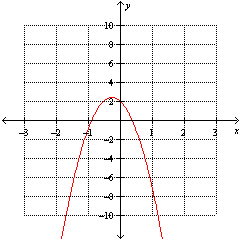
A)

B)

C)
D)
E)

A)


B)


C)

D)

E)


Unlock Deck
Unlock for access to all 73 flashcards in this deck.
Unlock Deck
k this deck
27
Find the vertex of  .
.
A)
B)
C)
D)
E)
 .
.A)

B)

C)

D)

E)


Unlock Deck
Unlock for access to all 73 flashcards in this deck.
Unlock Deck
k this deck
28
Express  in the standard form of a quadratic function.
in the standard form of a quadratic function.
A)
B)
C)
D)
E)
 in the standard form of a quadratic function.
in the standard form of a quadratic function.A)

B)

C)

D)

E)


Unlock Deck
Unlock for access to all 73 flashcards in this deck.
Unlock Deck
k this deck
29
Find the minimum value and the corresponding x -value at which the minimum occurs for the function  .
.
A) Minimum value of 5 occurs when
B) Minimum value of occurs when
occurs when 

C) Minimum value of occurs when
occurs when 

D) Minimum value of 1 occurs when
E) Minimum value of 1 occurs when

 .
.A) Minimum value of 5 occurs when

B) Minimum value of
 occurs when
occurs when 

C) Minimum value of
 occurs when
occurs when 

D) Minimum value of 1 occurs when

E) Minimum value of 1 occurs when



Unlock Deck
Unlock for access to all 73 flashcards in this deck.
Unlock Deck
k this deck
30
A function f is given by the table. Find when . 
A) 5
B) -4
C) 8
D) 0
E) -2

A) 5
B) -4
C) 8
D) 0
E) -2

Unlock Deck
Unlock for access to all 73 flashcards in this deck.
Unlock Deck
k this deck
31
Which one of the following functions describes a function f whose graph is a parabola with the vertex  and passes through the point
and passes through the point  ?
?
A)
B)
C)
D) f(x) =

E) f(x) =

 and passes through the point
and passes through the point  ?
?A)

B)

C)

D) f(x) =


E) f(x) =



Unlock Deck
Unlock for access to all 73 flashcards in this deck.
Unlock Deck
k this deck
32
Express  in the general form of a quadratic function.
in the general form of a quadratic function.
A)
B)
C)
D)
E)
 in the general form of a quadratic function.
in the general form of a quadratic function.A)

B)

C)

D)

E)


Unlock Deck
Unlock for access to all 73 flashcards in this deck.
Unlock Deck
k this deck
33
Using the graph below, find the y -value at which the maximum value of the function occurs. 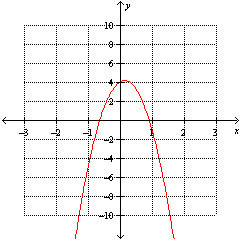
A) 7
7
B) 2
2
C)

D)

E) 2
2

A)
 7
7B)
 2
2C)


D)


E)
 2
2
Unlock Deck
Unlock for access to all 73 flashcards in this deck.
Unlock Deck
k this deck
34
If  represents John s salary per month (in thousands of dollars) after working
represents John s salary per month (in thousands of dollars) after working  number of months at a certain job, which one of the following would describe the meaning of
number of months at a certain job, which one of the following would describe the meaning of  ?
?
A) John s salary after working months at the job.
months at the job.
B) John's raise of $3 per month.
C) John's salary after working 3 months at the job.
D) Not enough information.
E) John's total number of months working at the job.
 represents John s salary per month (in thousands of dollars) after working
represents John s salary per month (in thousands of dollars) after working  number of months at a certain job, which one of the following would describe the meaning of
number of months at a certain job, which one of the following would describe the meaning of  ?
?A) John s salary after working
 months at the job.
months at the job.B) John's raise of $3 per month.
C) John's salary after working 3 months at the job.
D) Not enough information.
E) John's total number of months working at the job.

Unlock Deck
Unlock for access to all 73 flashcards in this deck.
Unlock Deck
k this deck
35
Find the vertex of  .
.
A)
B)
C)
D)
E)
 .
.A)

B)

C)

D)

E)


Unlock Deck
Unlock for access to all 73 flashcards in this deck.
Unlock Deck
k this deck
36
Find the maximum or minimum value of the quadratic function  .
.
A) The maximum value is .
.
B) The maximum value is .
.
C) The minimum value is 7.
D) The minimum value is .
.
E) The minimum value is .
.
 .
.A) The maximum value is
 .
.B) The maximum value is
 .
.C) The minimum value is 7.
D) The minimum value is
 .
.E) The minimum value is
 .
.
Unlock Deck
Unlock for access to all 73 flashcards in this deck.
Unlock Deck
k this deck
37
Find a quadratic function g whose graph is shown below. 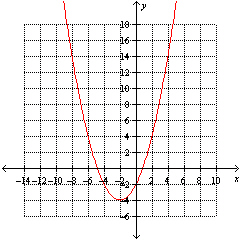
A)
B)
C)
D)
E)

A)

B)

C)

D)

E)


Unlock Deck
Unlock for access to all 73 flashcards in this deck.
Unlock Deck
k this deck
38
The graph of g is given below and represents a transformation of the graph of  . Which one of the functions best describes the graph of g .
. Which one of the functions best describes the graph of g . 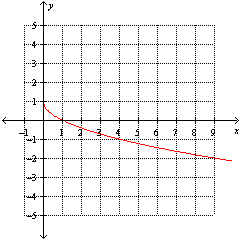
A)
B)
C)
D)
E)
 . Which one of the functions best describes the graph of g .
. Which one of the functions best describes the graph of g . 
A)

B)

C)

D)

E)


Unlock Deck
Unlock for access to all 73 flashcards in this deck.
Unlock Deck
k this deck
39
The graph of g is given below and represents a translation of the graph of  . Which one of the functions best describes the graph of g .
. Which one of the functions best describes the graph of g . 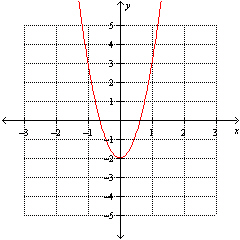
A)
B)
C)
D)
E)
 . Which one of the functions best describes the graph of g .
. Which one of the functions best describes the graph of g . 
A)

B)

C)

D)

E)


Unlock Deck
Unlock for access to all 73 flashcards in this deck.
Unlock Deck
k this deck
40
Express  in the standard form of a quadratic function.
in the standard form of a quadratic function.
A)
B)
C)
D)
E)
 in the standard form of a quadratic function.
in the standard form of a quadratic function.A)

B)

C)

D)

E)


Unlock Deck
Unlock for access to all 73 flashcards in this deck.
Unlock Deck
k this deck
41
Solve the equation  using the Quadratic Formula.
using the Quadratic Formula.
A)
B)
C)
D)
E) and
and 
 using the Quadratic Formula.
using the Quadratic Formula.A)

B)

C)

D)

E)
 and
and 

Unlock Deck
Unlock for access to all 73 flashcards in this deck.
Unlock Deck
k this deck
42
The number of oranges produced by each tree in an orange grove depends on how densely the trees are planted. If n trees are planted on an acre of land, then each tree produces  oranges. So the number of oranges produced per acre is
oranges. So the number of oranges produced per acre is  What is the maximum yield of the trees, and how many trees should be planted per acre to obtain the maximum yield of oranges? (Rounded to the nearest whole number)
What is the maximum yield of the trees, and how many trees should be planted per acre to obtain the maximum yield of oranges? (Rounded to the nearest whole number)
A) Maximum yield of the trees is 625 oranges when 9 trees are planted
B) Maximum yield of the trees is 10,851 oranges when 35 trees are planted
C) There is no maximum yield of the trees
D) Maximum yield of the trees is 7,350 oranges when 15 trees are planted
E) Maximum yield of the trees is 27,500 oranges when 100 trees are planted
 oranges. So the number of oranges produced per acre is
oranges. So the number of oranges produced per acre is  What is the maximum yield of the trees, and how many trees should be planted per acre to obtain the maximum yield of oranges? (Rounded to the nearest whole number)
What is the maximum yield of the trees, and how many trees should be planted per acre to obtain the maximum yield of oranges? (Rounded to the nearest whole number)A) Maximum yield of the trees is 625 oranges when 9 trees are planted
B) Maximum yield of the trees is 10,851 oranges when 35 trees are planted
C) There is no maximum yield of the trees
D) Maximum yield of the trees is 7,350 oranges when 15 trees are planted
E) Maximum yield of the trees is 27,500 oranges when 100 trees are planted

Unlock Deck
Unlock for access to all 73 flashcards in this deck.
Unlock Deck
k this deck
43
Find the discriminant of  .
.
A)
B)
C)
D)
E)
 .
.A)

B)

C)

D)

E)


Unlock Deck
Unlock for access to all 73 flashcards in this deck.
Unlock Deck
k this deck
44
Solve the equation  by factoring.
by factoring.
A) and
and 
B) and
and 
C) and
and 
D) and
and 
E) and
and 
 by factoring.
by factoring.A)
 and
and 
B)
 and
and 
C)
 and
and 
D)
 and
and 
E)
 and
and 

Unlock Deck
Unlock for access to all 73 flashcards in this deck.
Unlock Deck
k this deck
45
A ball is thrown straight upward from a bridge and then falls all the way to the ground (past the bridge). The ball s height h (in feet) above the ground t seconds after the ball is thrown is given by  . What is the average rate of change of the height of the ball between
. What is the average rate of change of the height of the ball between  seconds and
seconds and  seconds?
seconds?
A) 0.3 ft/sec
B) 42.40 ft/sec
C) 115 ft/sec
D) 136.44 ft/sec
E) 213.09 ft/sec
 . What is the average rate of change of the height of the ball between
. What is the average rate of change of the height of the ball between  seconds and
seconds and  seconds?
seconds?A) 0.3 ft/sec
B) 42.40 ft/sec
C) 115 ft/sec
D) 136.44 ft/sec
E) 213.09 ft/sec

Unlock Deck
Unlock for access to all 73 flashcards in this deck.
Unlock Deck
k this deck
46
Solve the equation  by factoring.
by factoring.
A)
 and
and 

B)
 and
and 

C)
 and
and 

D) and
and 
E) and
and 
 by factoring.
by factoring.A)

 and
and 

B)

 and
and 

C)

 and
and 

D)
 and
and 
E)
 and
and 

Unlock Deck
Unlock for access to all 73 flashcards in this deck.
Unlock Deck
k this deck
47
Which one of the following is the graph for the function  ?
?
A)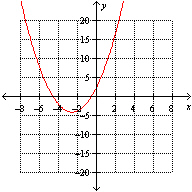
B)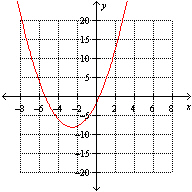
C) None of these options
D)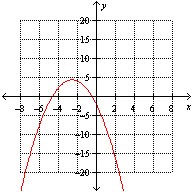
E)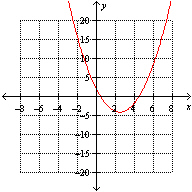
 ?
?A)

B)

C) None of these options
D)

E)


Unlock Deck
Unlock for access to all 73 flashcards in this deck.
Unlock Deck
k this deck
48
Find the discriminant of  .
.
A)
B)
C)
D)
E)
 .
.A)

B)

C)

D)

E)


Unlock Deck
Unlock for access to all 73 flashcards in this deck.
Unlock Deck
k this deck
49
For the graph below, find the solution(s) to the equation  .
. 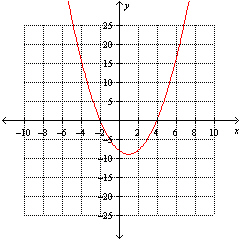
A) and
and 
B)
C) and
and 
D) and
and 
E)
 and
and 
 .
. 
A)
 and
and 
B)

C)
 and
and 
D)
 and
and 
E)

 and
and 

Unlock Deck
Unlock for access to all 73 flashcards in this deck.
Unlock Deck
k this deck
50
Solve the equation  using the Quadratic Formula.
using the Quadratic Formula.
A) and
and 
B) and
and 
C) and
and 
D) and
and 
E) and
and 
 using the Quadratic Formula.
using the Quadratic Formula.A)
 and
and 
B)
 and
and 
C)
 and
and 
D)
 and
and 
E)
 and
and 

Unlock Deck
Unlock for access to all 73 flashcards in this deck.
Unlock Deck
k this deck
51
Find the equation that represents the function graphed below. 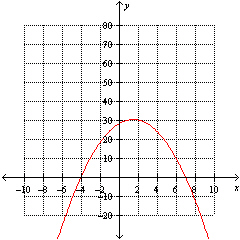
A)
B)
C)
D)
E)

A)

B)

C)

D)

E)


Unlock Deck
Unlock for access to all 73 flashcards in this deck.
Unlock Deck
k this deck
52
Solve the equation  using the Quadratic Formula.
using the Quadratic Formula.
A)

B)
 and
and 
C)

D)
 and
and 

E)

 using the Quadratic Formula.
using the Quadratic Formula.A)


B)

 and
and 
C)


D)

 and
and 

E)



Unlock Deck
Unlock for access to all 73 flashcards in this deck.
Unlock Deck
k this deck
53
Sam has 600 ft of fencing to fence in a rectangular garden. Find a function A that models the area of the garden in terms of the width of the garden and determine the maximum area of the garden and the corresponding width of the garden to attain this maximum area.
A) ; Maximum area of 67,500 square feet occurs for a garden of width 150 ft
; Maximum area of 67,500 square feet occurs for a garden of width 150 ft
B) ; Maximum area of 300 square feet occurs for a garden of width 299.00 ft
; Maximum area of 300 square feet occurs for a garden of width 299.00 ft
C) ; Maximum area of 300 square feet occurs for a garden of width 0 ft
; Maximum area of 300 square feet occurs for a garden of width 0 ft
D) ; Maximum area of 45,000 square feet occurs for a garden of width 150 ft
; Maximum area of 45,000 square feet occurs for a garden of width 150 ft
E) ; Maximum area of 22,500 square feet occurs for a garden of width 150 ft
; Maximum area of 22,500 square feet occurs for a garden of width 150 ft
A)
 ; Maximum area of 67,500 square feet occurs for a garden of width 150 ft
; Maximum area of 67,500 square feet occurs for a garden of width 150 ftB)
 ; Maximum area of 300 square feet occurs for a garden of width 299.00 ft
; Maximum area of 300 square feet occurs for a garden of width 299.00 ftC)
 ; Maximum area of 300 square feet occurs for a garden of width 0 ft
; Maximum area of 300 square feet occurs for a garden of width 0 ftD)
 ; Maximum area of 45,000 square feet occurs for a garden of width 150 ft
; Maximum area of 45,000 square feet occurs for a garden of width 150 ftE)
 ; Maximum area of 22,500 square feet occurs for a garden of width 150 ft
; Maximum area of 22,500 square feet occurs for a garden of width 150 ft
Unlock Deck
Unlock for access to all 73 flashcards in this deck.
Unlock Deck
k this deck
54
A ball is thrown straight upward from a bridge and then falls all the way to the ground (past the bridge). The ball s height h (in feet) above the ground t seconds after the ball is thrown is given by  . What is the maximum height attained by the ball, and after how many seconds is that height attained?
. What is the maximum height attained by the ball, and after how many seconds is that height attained?
A) Maximum height of the ball is 160 ft after 2 seconds
B) Maximum height of the ball is ft after
ft after  seconds
seconds
C) Maximum height of the ball is 130 ft after 0.5 seconds
D) Maximum height of the ball is ft after 1 seconds
ft after 1 seconds
E) Maximum height of the ball is 104 ft after 0 seconds
 . What is the maximum height attained by the ball, and after how many seconds is that height attained?
. What is the maximum height attained by the ball, and after how many seconds is that height attained?A) Maximum height of the ball is 160 ft after 2 seconds
B) Maximum height of the ball is
 ft after
ft after  seconds
secondsC) Maximum height of the ball is 130 ft after 0.5 seconds
D) Maximum height of the ball is
 ft after 1 seconds
ft after 1 secondsE) Maximum height of the ball is 104 ft after 0 seconds

Unlock Deck
Unlock for access to all 73 flashcards in this deck.
Unlock Deck
k this deck
55
Which one of the following is the graph for the function  ?
?
A)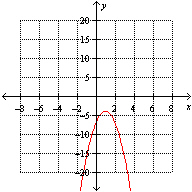
B)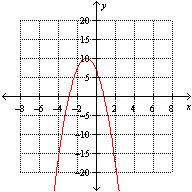
C)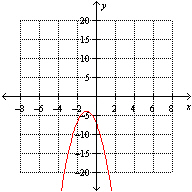
D)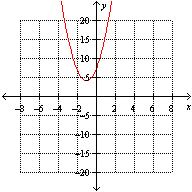
E)
 ?
?A)

B)

C)

D)

E)


Unlock Deck
Unlock for access to all 73 flashcards in this deck.
Unlock Deck
k this deck
56
Find the maximum value and the corresponding x -value at which the maximum occurs for the function  .
.
A) Maximum value of 12 occurs when
B) Maximum value of 28 occurs when 12
12
C) Maximum value of 4 occurs when 0
0
D) Maximum value of 12 occurs when 28
28
E) Maximum value of 28 occurs when

 .
.A) Maximum value of 12 occurs when

B) Maximum value of 28 occurs when
 12
12C) Maximum value of 4 occurs when
 0
0D) Maximum value of 12 occurs when
 28
28E) Maximum value of 28 occurs when



Unlock Deck
Unlock for access to all 73 flashcards in this deck.
Unlock Deck
k this deck
57
Solve the equation  by factoring.
by factoring.
A)
 and
and 

B)
 and
and 

C)
 and
and 

D) and
and 
E) and
and 
 by factoring.
by factoring.A)

 and
and 

B)

 and
and 

C)

 and
and 

D)
 and
and 
E)
 and
and 

Unlock Deck
Unlock for access to all 73 flashcards in this deck.
Unlock Deck
k this deck
58
Using the graph below, choose the correct answer for the x -intercept(s), y -intercept, and vertex. 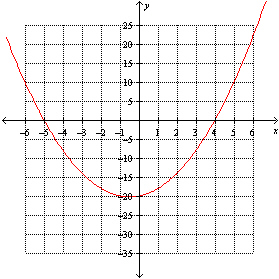
A) x -intercepts are and
and  ; y -intercept is
; y -intercept is  ; vertex is
; vertex is 
B) x -intercepts are and
and  ; y -intercept is
; y -intercept is  ; vertex is
; vertex is 
C) x -intercepts are and
and  ; y -intercept is
; y -intercept is  ; vertex is
; vertex is 
D) x -intercepts are and
and  ; there are no y -intercepts; vertex is
; there are no y -intercepts; vertex is 
E) x -intercept is ; y -intercept is
; y -intercept is  ; vertex is
; vertex is 

A) x -intercepts are
 and
and  ; y -intercept is
; y -intercept is  ; vertex is
; vertex is 
B) x -intercepts are
 and
and  ; y -intercept is
; y -intercept is  ; vertex is
; vertex is 
C) x -intercepts are
 and
and  ; y -intercept is
; y -intercept is  ; vertex is
; vertex is 
D) x -intercepts are
 and
and  ; there are no y -intercepts; vertex is
; there are no y -intercepts; vertex is 
E) x -intercept is
 ; y -intercept is
; y -intercept is  ; vertex is
; vertex is 

Unlock Deck
Unlock for access to all 73 flashcards in this deck.
Unlock Deck
k this deck
59
Find the discriminant of  .
.
A)
B)
C)
D)
E)
 .
.A)

B)

C)

D)

E)


Unlock Deck
Unlock for access to all 73 flashcards in this deck.
Unlock Deck
k this deck
60
Solve the equation  using the Quadratic Formula. Round answers to nearest hundredth.
using the Quadratic Formula. Round answers to nearest hundredth.
A) and
and 
B) No real solutions
C) and
and 
D) and
and 
E) and
and 
 using the Quadratic Formula. Round answers to nearest hundredth.
using the Quadratic Formula. Round answers to nearest hundredth.A)
 and
and 
B) No real solutions
C)
 and
and 
D)
 and
and 
E)
 and
and 

Unlock Deck
Unlock for access to all 73 flashcards in this deck.
Unlock Deck
k this deck
61
A rectangular parking lot is 20 feet longer than it is wide. Which one of the following functions model the area of the lot?
A)
B)
C)
D)
E)
A)

B)

C)

D)

E)


Unlock Deck
Unlock for access to all 73 flashcards in this deck.
Unlock Deck
k this deck
62
A ball is thrown straight upward from a bridge and then falls all the way to the ground (past the bridge). The ball s height h (in feet) above the ground t seconds after the ball is thrown is given by  . Does the ball reach a height of 251 feet?
. Does the ball reach a height of 251 feet?
 . Does the ball reach a height of 251 feet?
. Does the ball reach a height of 251 feet?
Unlock Deck
Unlock for access to all 73 flashcards in this deck.
Unlock Deck
k this deck
63
The following table shows the values of the number of gallons of water used by a family during the month of July.

Find the quadratic model based on the data provided that determines the number of gallons of water used as a function of the day. (Rounded to the nearest hundredth)
A)
B) Not enough information.
C)
D)
E)

Find the quadratic model based on the data provided that determines the number of gallons of water used as a function of the day. (Rounded to the nearest hundredth)
A)

B) Not enough information.
C)

D)

E)


Unlock Deck
Unlock for access to all 73 flashcards in this deck.
Unlock Deck
k this deck
64
Express  in the general form of a quadratic function.
in the general form of a quadratic function.
A)
B)
C)
D)
E)
 in the general form of a quadratic function.
in the general form of a quadratic function.A)

B)

C)

D)

E)


Unlock Deck
Unlock for access to all 73 flashcards in this deck.
Unlock Deck
k this deck
65
A penny is dropped from a high-rise building that is 350 feet high. After 8.4 seconds, the penny hits the ground. Which one of the following quadratic models describe the height of the penny above ground as a function of the time elapsed since the penny was dropped?
A)
B)
C)
D)
E)
A)

B)

C)

D)

E)


Unlock Deck
Unlock for access to all 73 flashcards in this deck.
Unlock Deck
k this deck
66
A diver jumps off the springboard and dives into a pool. The following table shows the distance of the diver from the surface of the water as a function of the time (in seconds) it takes for the diver to enter the water of the pool.  Which one of the following is an appropriate scatterplot for this data?
Which one of the following is an appropriate scatterplot for this data?
A)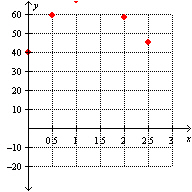
B)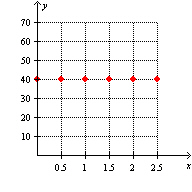
C)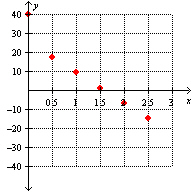
D)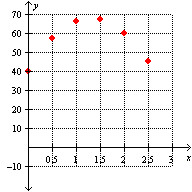
E) None of these options
 Which one of the following is an appropriate scatterplot for this data?
Which one of the following is an appropriate scatterplot for this data?A)

B)

C)

D)

E) None of these options

Unlock Deck
Unlock for access to all 73 flashcards in this deck.
Unlock Deck
k this deck
67
A diver jumps off the springboard and dives into a pool. The following table shows the distance of the diver from the surface of the water as a function of the time (in seconds) it takes for the diver to enter the water of the pool.
 Which one of the following is the quadratic model that best fits the data provided? (Rounded to the nearest tenth)
Which one of the following is the quadratic model that best fits the data provided? (Rounded to the nearest tenth)
A)
B) Not enough information.
C)
D)
E)
 Which one of the following is the quadratic model that best fits the data provided? (Rounded to the nearest tenth)
Which one of the following is the quadratic model that best fits the data provided? (Rounded to the nearest tenth)A)

B) Not enough information.
C)

D)

E)


Unlock Deck
Unlock for access to all 73 flashcards in this deck.
Unlock Deck
k this deck
68
A rectangular parking lot is 22 feet longer than it is wide. If the lot has an area of 9,000 square feet, then what are the dimensions of the lot?
A) The width of the parking lot is 84.5 ft and the length is 106.5 ft.
B) The width of the parking lot is 95 ft and the length is 100 ft.
C) The width of the parking lot is 78 ft and the length is 121.8 ft.
D) The width of the parking lot is 74.5 ft and the length is 127.5 ft.
E) The width of the parking lot is 89 ft and the length is 106.7 ft.
A) The width of the parking lot is 84.5 ft and the length is 106.5 ft.
B) The width of the parking lot is 95 ft and the length is 100 ft.
C) The width of the parking lot is 78 ft and the length is 121.8 ft.
D) The width of the parking lot is 74.5 ft and the length is 127.5 ft.
E) The width of the parking lot is 89 ft and the length is 106.7 ft.

Unlock Deck
Unlock for access to all 73 flashcards in this deck.
Unlock Deck
k this deck
69
Using the data provided, create a quadratic model that best fits the data. 
A)
B)
C)
D)
E)

A)

B)

C)

D)

E)


Unlock Deck
Unlock for access to all 73 flashcards in this deck.
Unlock Deck
k this deck
70
Based on the quadratic model that best fits the data, find the value of y when x is 6.8. (Rounded to the nearest hundredth) 
A) 99.72
B) 72.00
C) 72.50
D) 254.23
E) 110.38

A) 99.72
B) 72.00
C) 72.50
D) 254.23
E) 110.38

Unlock Deck
Unlock for access to all 73 flashcards in this deck.
Unlock Deck
k this deck
71
A diver jumps off the springboard and dives into a pool. The following table shows the distance of the diver from the surface of the water as a function of the time (in seconds) it takes for the diver to enter the water of the pool.

Based on a quadratic regression model, when will the diver enter the water? (Rounded to the nearest tenth)
A) After 2.8 seconds
B) After 2.6 seconds
C) After 2.9 seconds
D) After 2.7 seconds
E) After 3.0 seconds

Based on a quadratic regression model, when will the diver enter the water? (Rounded to the nearest tenth)
A) After 2.8 seconds
B) After 2.6 seconds
C) After 2.9 seconds
D) After 2.7 seconds
E) After 3.0 seconds

Unlock Deck
Unlock for access to all 73 flashcards in this deck.
Unlock Deck
k this deck
72
A ball is thrown straight upward from a bridge and then falls all the way to the ground (past the bridge). The ball s height h (in feet) above the ground t seconds after the ball is thrown is given by  . When does the ball hit the ground?
. When does the ball hit the ground?
A) The ball never hits the ground.
B) After 5.79 seconds
C) After 1.29 seconds
D) After 3 seconds
E) After 0 seconds
 . When does the ball hit the ground?
. When does the ball hit the ground?A) The ball never hits the ground.
B) After 5.79 seconds
C) After 1.29 seconds
D) After 3 seconds
E) After 0 seconds

Unlock Deck
Unlock for access to all 73 flashcards in this deck.
Unlock Deck
k this deck
73
Is a quadratic function an appropriate model for the following data?



Unlock Deck
Unlock for access to all 73 flashcards in this deck.
Unlock Deck
k this deck



